Logistics ERP (Enterprise Resource Planning) systems represent a fusion of software capabilities designed to transform how logistics businesses manage their operations. As you explore these logistics ERP solutions, gain insights into what these systems are, their benefits, and some of the top software options that can help uplift your business's logistics management.
What Is Logistics ERP System?
A Logistics ERP System is a comprehensive software solution tailored to streamline all facets of logistics management. It's like a multifunctional command center for your entire supply chain operations, empowering you with control over inventory, shipments, procurement, order fulfillment, and more. Logistics ERP encompasses a suite of integrated applications that work in tandem to facilitate the smooth flow of goods from suppliers to customers and ensures that every segment of your logistics chain communicates effectively. With a logistics ERP system, you set the stage for seamless operations, grounded in accurate, timely data, leading to cost-efficient and customer-focused logistics management.
General ERP vs Logistics ERP
When comparing General ERP and Logistics ERP systems, think of the former as an all-encompassing tool and the latter as a specialized craftsman's instrument. General ERP systems integrate various functions of an organization, creating a central hub for finance, HR, customer relations, and more. This broad applicability provides a unified decision-making and cohesive management across departments.
On the flip side, Logistics ERP systems are the ace up the sleeve for supply chain precision. They laser-focus on the nuances of logistics, going beyond the surface to offer specialized capabilities such as detailed warehouse management, sophisticated tracking systems, and advanced shipping logistics.
Where a General ERP paves the way for overall business efficiency, a Logistics ERP system fine-tunes your supply chain, significantly reducing transportation costs, speeding up delivery times, and enhancing the agility of operations critical to businesses where logistics is the heartbeat.
Why Is Having Logistics ERP System Important?
Embracing a Logistics ERP system is not just an upgrade; it's a strategic revolution for your business. In the logistics-intensive landscape, having a specialized ERP system is important because it becomes your eyes and ears across the supply chain, relaying crucial information in real-time and providing the tools to respond swiftly to any situation. Gone are the days of tracking shipments through a fog of uncertainty or struggling to comply with complex trade regulations. A Logistics ERP ensures you adhere to compliance demands with ease and helps keep every consignment under vigilant surveillance.
With customer expectations continually rising, a Logistics ERP serves as a catalyst for delivering exceptional service, facilitating the kind of transparency and reliability your customers seek. It amplifies your capabilities to manage inventory efficiently, reduces errors in order fulfillment, and saves on unnecessary operational costs — the result is a more robust bottom line and a formidable reputation in the market.
Benefits of Logistics ERP Systems
Below are the main benefits of using a logistics ERP system.
Streamlining Operations and Improving Efficiency
The magic of a Logistics ERP system lies in its power to make complex operations look simple. Your logistics processes can be transformed into a seamless, well-oiled machine, with each task flowing smoothly into the next. When you automate mundane tasks, your team is freed to focus on strategy and growth. For instance, tasks like creating financial reports or scheduling maintenance for vehicles become automated, eliminating manual errors and streamlining workflows. Suddenly, you're closing your books faster, optimizing routes with ease, and ensuring your fleet is always in prime condition.
Increased efficiency also comes from the system's ability to integrate different logistics components into a unified platform. This integration means less time chasing down information across various systems and more time spent acting on insights that can propel the business forward.
Enhancing Inventory Management
Imagine having complete command over your inventory, from the warehouse to the customer's doorstep. Logistics ERP systems elevate inventory management, transforming it into a strategic asset. With real-time tracking, you're always aware of your stock levels, can anticipate demand, and make savvy purchasing decisions. These systems enable sophisticated approaches like just-in-time inventory, where you keep precisely what's needed on hand, reducing holding costs and freeing up capital.
Warehouse organization is amplified too — with insights on best layout practices and optimal placement of goods, enhancing accessibility and making putaway and picking processes a cinch. The result? Inventory is always at the right place, at the right time, in the right quantity, ensuring you can deliver on your customer promises every single time.
Automating Procurement and Supply Chain Processes
Transitioning to a Logistics ERP system automates procurement and supply chain processes in a way that feels like upgrading from a bicycle to a high-speed train. With automation, you wave goodbye to manual purchase orders and endless spreadsheets. Instead, procurement becomes a streamlined affair with automated reordering, approval workflows, and supplier management that paint a picture of efficiency and control.
Automation extends to broader supply chain processes too. Imagine predictive analytics helping you anticipate market changes and adjust your supply chain proactively. Automated alerts keep you informed about unforeseen delays or disruptions, allowing you to pivot before your bottom line feels the impact. With a Logistics ERP, not only do you keep the gears of your supply chain moving, but you also advance your capability to forecast, plan, and execute with precision.
Improving Accuracy in Order Fulfillment
Accuracy in order fulfillment is the cornerstone of customer satisfaction and repeat business. With a Logistics ERP system, you can wave farewell to the days of incorrect shipments and frustrated customers. These systems deploy advanced data management and automation to ensure that what's ordered is precisely what's delivered.
With features like real-time inventory updates and pick-to-light systems, warehouse staff can accurately and swiftly locate items. They decrease the likelihood of human error, leading to more accurate order picking. Automated order processing workflows mean that the chances of oversights or mix-ups plummet. Your customers receive their orders on time and just as they expected, which not only saves on costly returns but also builds trust and loyalty.
Integrating and Analyzing Data for Better Decision-Making
Data is gold in the modern business landscape, but it's the refining process that truly unlocks its value. Logistics ERP systems excel at integrating data from diverse sources within your logistics chain, creating a consolidated repository where every number tells a story. With tailored reports and interactive dashboards at your fingertips, you transform raw data into actionable insights that drive better decision-making.
Whether it's fleet efficiency, sales trends, or financial health, a Logistics ERP system dissects the data, allowing you to conduct root cause analyses, engage in scenario planning, and employ predictive analytics. This data-driven approach underpins your strategic decisions, from adjusting routes to improving delivery times, ensuring that your logistics operations are not only responsive but also intelligently proactive.
Providing Real-time Tracking and Monitoring
The ability to see what's happening at any given moment across your supply chain can feel like having a superpower. Logistics ERP systems provide this power through real-time tracking and monitoring. They offer you live updates, so you're never in the dark about where your goods are or when they'll reach their destination. With GPS technology, you can track your fleet's every move, optimize delivery routes on the fly, and respond instantly to customer queries about shipment statuses.
Monitoring extends beyond tracking, enabling a watchful eye over mission-critical KPIs, such as vehicle utilization, driver performance, and fuel consumption. This real-time visibility empowers you to jump on any discrepancies, enhance the efficiency of delivery operations, and even anticipate issues before they arise — all leading to more on-time deliveries and fewer unhappy customers or unnecessary costs.
Reducing Operational Costs and Waste
Trimming down your operational costs without compromising on service quality can seem like a tall order. Yet, with Logistics ERP systems, this balancing act becomes much more achievable. When you hone in on the most efficient practices, such as bundling shipments, optimizing routes, and automating administrative tasks, you slash time and expenditures in one fell swoop.
The precision of inventory management within ERP systems also plays a pivotal role in waste reduction. When you predict demand with greater accuracy and monitor stock levels in real time, you skirt the issues of overstocking and understocking, hence reducing the costs associated with unsold inventory. Regular maintenance scheduling ensures your fleet is always running efficiently, avoiding costly downtime and repairs. Combining these factors means your business runs leaner, with reduced waste and operational costs, boosting your profits and sustainability together.
Improving Customer Service and Satisfaction
In the dynamic dance of logistics, how well you lead with customer service often decides the tune of your market reputation. Logistics ERP systems are an invisible force multiplier, significantly enhancing your customer service and satisfaction. They provide tools for prompt and precise communication and have the ability to deliver goods with the accuracy and speed that customers today demand.
ERP systems integrate customer histories and preferences, and allow for personalized service that can make customers feel valued and understood. Service can be proactive — for instance, notifying a customer of a delay before they need to ask or offering solutions before a problem escalates. With the ability to tap into detailed customer data and feedback collected through your logistics operations, you continuously refine your offerings and interactions, ensuring that customer satisfaction goes beyond delivery and becomes a staunch loyalty.
Facilitating Compliance and Reporting
Steering through the labyrinth of industry regulations and standards can be daunting, but Logistics ERP systems turn this challenge into a simple path forward. They maintain up-to-date records of all logistics operations, ensuring you're always ready for audits with complete audit trails at your disposal. The software can be configured to meet the specific compliance requirements of various regions and sectors, adapting to rules related to transportation, customs, safety, and environmental concerns.
For reporting, ERP solutions are unequaled in their ability to generate timely and customized reports that cater both internally to management and externally to regulators or customers. These reports can cover everything from financials to operational KPIs, empowering stakeholders with the clarity they need. In essence, Logistics ERP systems ensure that you not only operate within legal frameworks but also communicate transparency and accountability at every turn.
Supporting Scalability and Growth Opportunities
At the heart of any growing business lies the potential for scale, and Logistics ERP systems lay the groundwork for just such expansion. As businesses evolve, the complexities of managing more customers, launching into new territories, or tackling larger orders can impose significant strain on existing operations. ERP systems meet these challenges head-on with scalable architecture that grows in step with your business.
They accommodate adding new warehouses or distribution channels and handle increased order volumes without a hitch, ensuring that the backbone of your operations remains steadfast. Scalability goes beyond capacity, extending to the seamless addition of new functionalities, modules, and custom integrations, allowing you to tailor the system to your evolving business model. With a robust ERP solution, growth becomes a seamless transition rather than a hurdle, turning ambitious strategies into realities.

11 Best Logistics ERP Systems
Let’s take a look at the 11 best logistics ERP systems and their features, pros and cons.
1. Kohezion

Kohezion stands out as a user-friendly Logistics ERP solution, earning its place among the best options for transforming logistics management. What makes Kohezion appealing is its commitment to customization and ease of use, allowing businesses to craft an ERP experience that aligns perfectly with their unique processes.
Top 5 Features:
- Customizable dashboards and applications.
- Powerful data management and reporting tools.
- No-code application building platform.
- Extensive project tracking and collaboration features.
- Comprehensive training and customer support.
Five Benefits:
- Robust customization aligns with specific operational needs.
- Streamlines data-driven decision-making processes.
- Facilitates seamless collaboration across departments and teams.
- Lowers the learning curve with intuitive user interfaces.
- Amplifies agility in adjusting logistics operations in response to changes.
Two Cons:
- May require an initial investment of time to build custom applications.
- Businesses with highly complex logistics might need additional customization.
Best For: Kohezion is best suited for large enterprises or departments within larger companies that require a flexible, easily adoptable ERP system that can be tailored to their specific logistical needs without extensive programming.
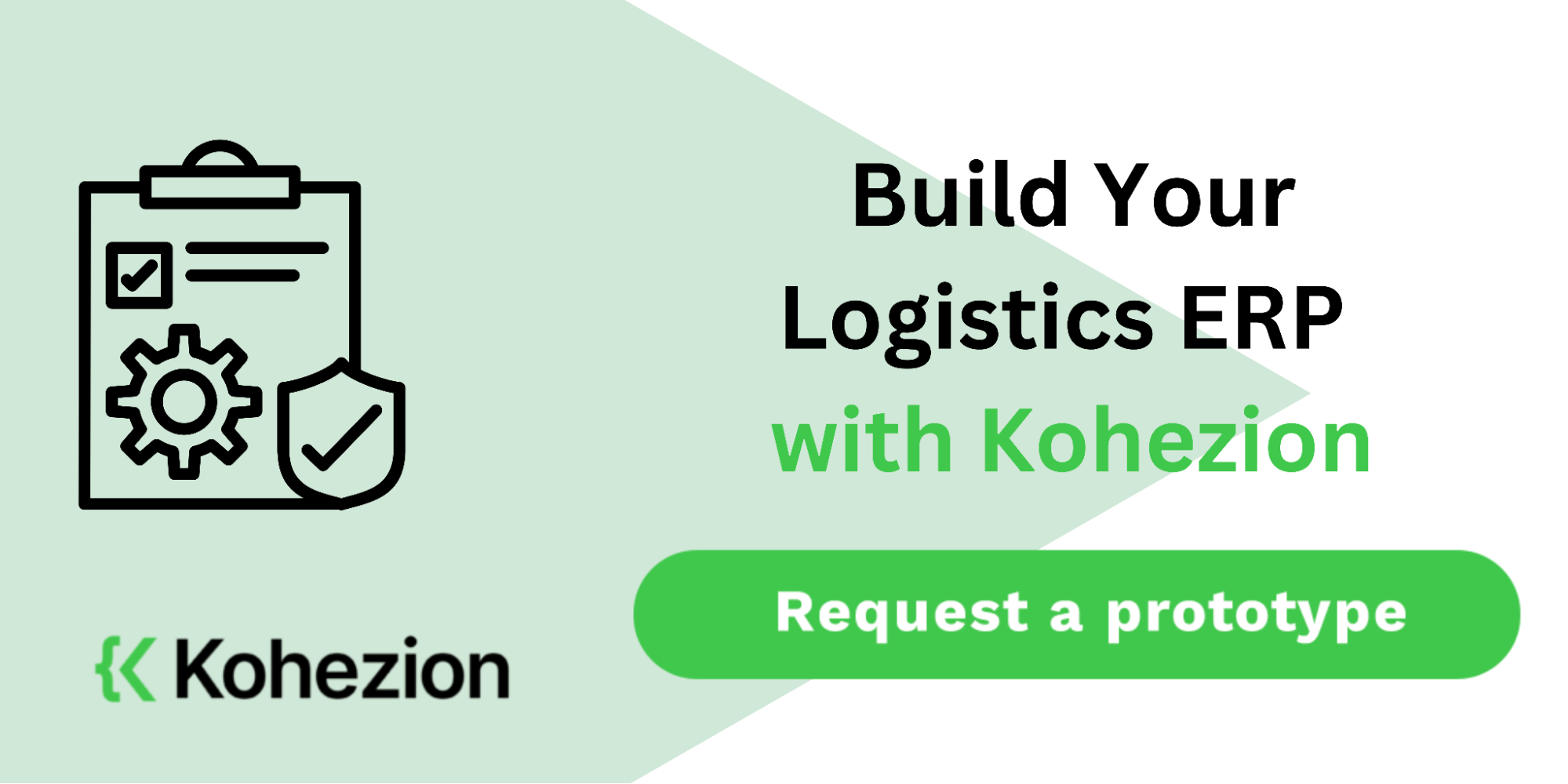
2. SAP S/4HANA

SAP S/4HANA for Logistics Management is a robust and intelligent ERP solution designed to handle the complexities of modern logistics operations. It excels in integrating advanced analytics and offering real-time insights, making it an optimal choice for mid-sized to large enterprises seeking to boost their logistics efficiency and embrace digital transformation.
Top 5 Features:
- In-memory computing for fast data processing.
- Advanced analytics with SAP Fiori user experience.
- Integrations with SAP Transportation Management and SAP Business Network.
- Comprehensive finance and HR management modules.
- Flexible deployment options: cloud, on-premise, or hybrid.
Five Benefits:
- High-speed data processing increases responsiveness to market demands.
- Real-time analytics promote informed decision-making at every level.
- Seamless integration capabilities streamline end-to-end logistics operations.
- A holistic approach to business management connects logistics with core aspects such as finance.
- Deployment versatility ensures solutions fit your operational needs and preferences.
Two Cons:
- The complexity of customization may require additional time and resources.
- Potential vendor lock-in could limit future flexibility in system changes.
Best For: SAP S/4HANA is ideal for medium-sized to large companies, particularly those with complex logistics processes, requiring an integrated suite that can manage large volumes of data and support sophisticated reporting needs.
3. Oracle Netsuite
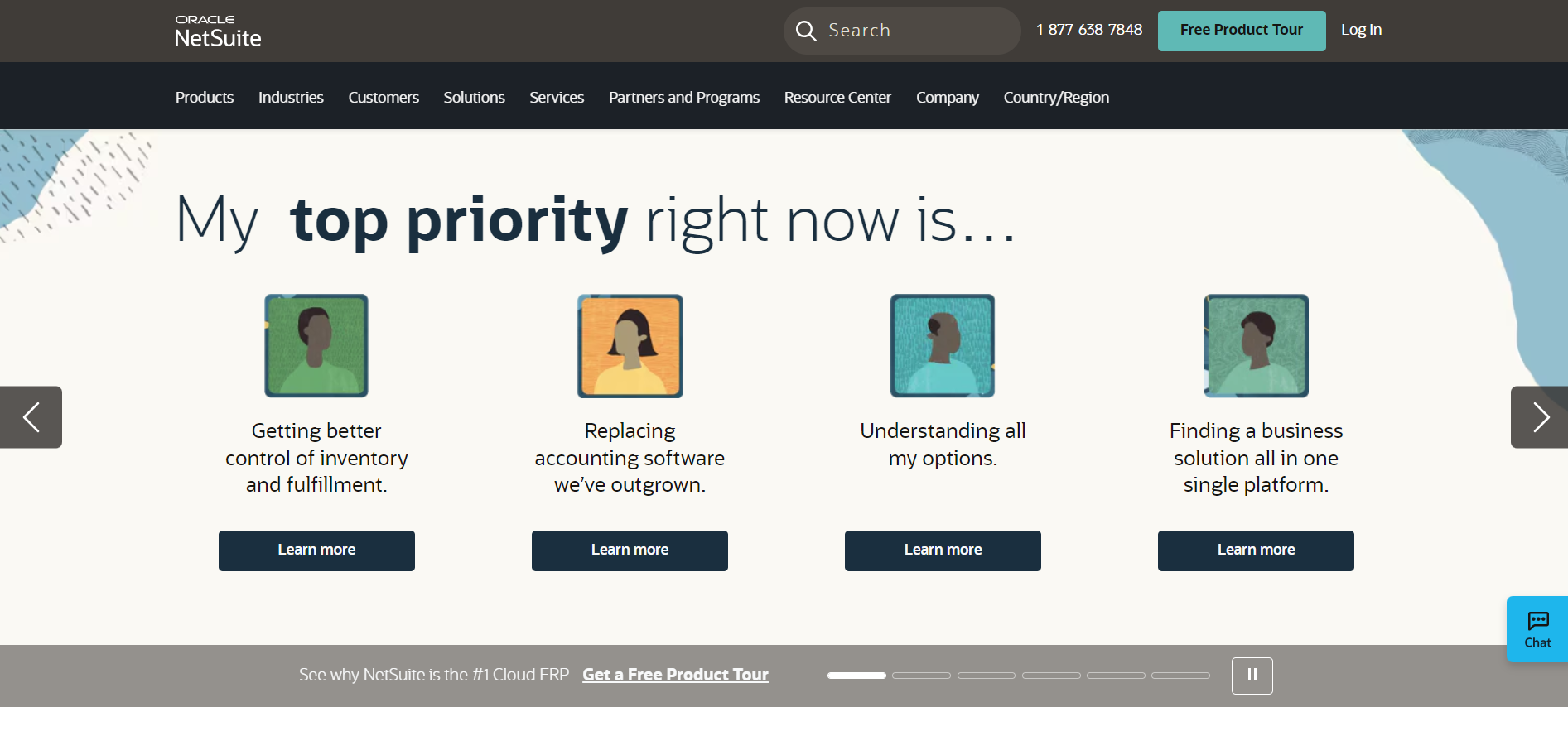
Oracle NetSuite stands tall with its cloud-based logistics solutions offering real-time data and analytics. It's renowned for its ability to power up logistics operations with end-to-end visibility and control. Ideal for businesses aiming to refine supply chain management through cloud computing, NetSuite's centralized system simplifies decision-making and responds to changes with agility.
Top 5 Features:
- Cloud-based architecture offers global accessibility.
- Integration of supply chain workflows within the ERP.
- Real-time visibility into inventory and warehouse operations.
- Advanced demand planning with analytics tools.
- Comprehensive finance and CRM modules.
Five Benefits:
- Unrestricted access to logistics data anytime, anywhere.
- Streamlines multiple logistics functions into a single, cohesive system.
- Enhanced inventory management maximizes product availability and minimizes waste.
- Demand planning tools help anticipate customer needs and optimize stock levels.
- Unifies financials with logistics operations for complete business oversight.
Two Cons:
- The breadth of features can be overwhelming, necessitating proper training.
- Customization capabilities might require professional services, increasing costs.
Best For: Oracle NetSuite is best for fast-growing small to mid-sized businesses and enterprises looking for a comprehensive, cloud-based ERP solution that facilitates real-time logistics management and agile decision-making.
4. Microsoft Dynamics 365
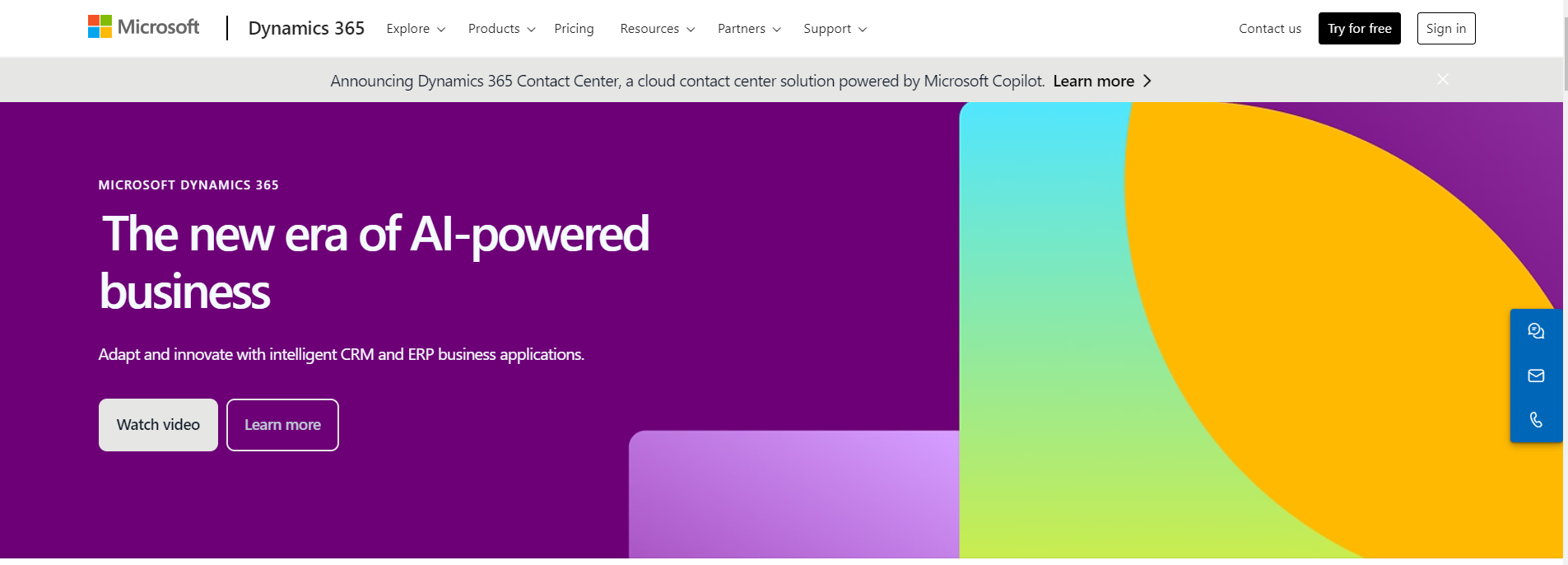
Microsoft Dynamics 365 Supply Chain Management reshapes how you perceive logistical operations, as it integrates AI, IoT, and mixed reality into its platform. Especially suitable for organizations poised to take a leap into the future of logistics, Dynamics 365 offers a blend of innovative technologies and traditional operational excellence.
Top 5 Features:
- AI-driven insights for supply chain optimization.
- IoT connectivity for real-time asset tracking and management.
- Advanced warehouse and transport management systems.
- Seamless integration with other Dynamics 365 applications.
- Mixed reality tools for enhanced training and operations.
Five Benefits:
- Predictive analytics guide proactive supply chain adjustments.
- IoT offers detailed tracking for improved asset utilization and maintenance.
- Comprehensive logistics modules streamline warehouse and transport operations.
- Unified ecosystem with CRM, sales, and more for end-to-end business process integration.
- Cutting-edge tech applications, like AR in training, provide competitive advantages.
Two Cons:
- Complexity of the platform may cause steeper learning curves for staff.
- Full suite of features might represent a significant investment for smaller businesses.
Best For: Microsoft Dynamics 365 Supply Chain Management is optimal for medium to large-sized businesses prioritizing scalability and innovation, desiring a forward-thinking approach to logistics and a system that can grow and evolve with their needs.
5. Infor CloudSuite
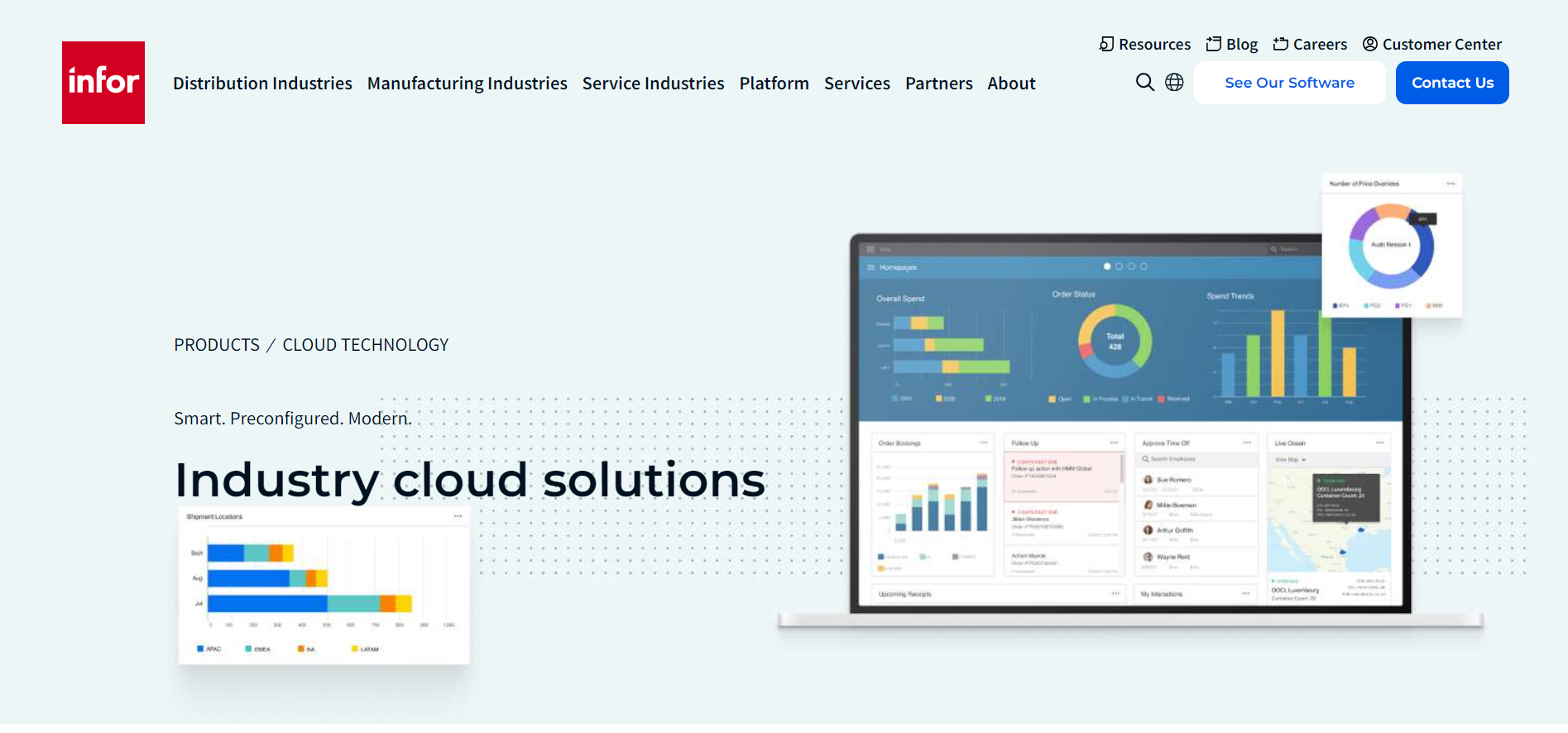
Infor CloudSuite Logistics Solution is a game-changer for businesses that prioritize deep industry functionality combined with cloud flexibility. This cloud-based ERP suite offers a plethora of features tailored for transportation and logistics companies, helping them to efficiently manage intricacies while scaling operations.
Top 5 Features:
- Finance management and accounting for complete financial oversight.
- Customer relationship management to keep client service sharp.
- Inventory and order management aimed at precision and control.
- HR management to streamline workforce demands.
- Advanced analytics with BI for transformative data insights.
Five Benefits:
- Streamlines financial operations with robust accounting features.
- Enhances CRM to deepen customer engagement and satisfaction.
- Offers comprehensive control over inventory, reducing waste and improving accuracy.
- Simplifies complex HR tasks, ensuring team productivity remains high.
- Leverages BI for strategic decision-making that drives business growth.
Two Cons:
- Over time, the cumulative costs can be substantial.
- The user interface may not match the intuitiveness of newer ERP applications.
Best For: Infor CloudSuite is most beneficial for small to midsize companies, including manufacturing and distribution organizations that are seeking a supply chain-focused ERP application capable of growing in the cloud and optimizing their logistics from coordination to delivery.
6. Epicor ERP
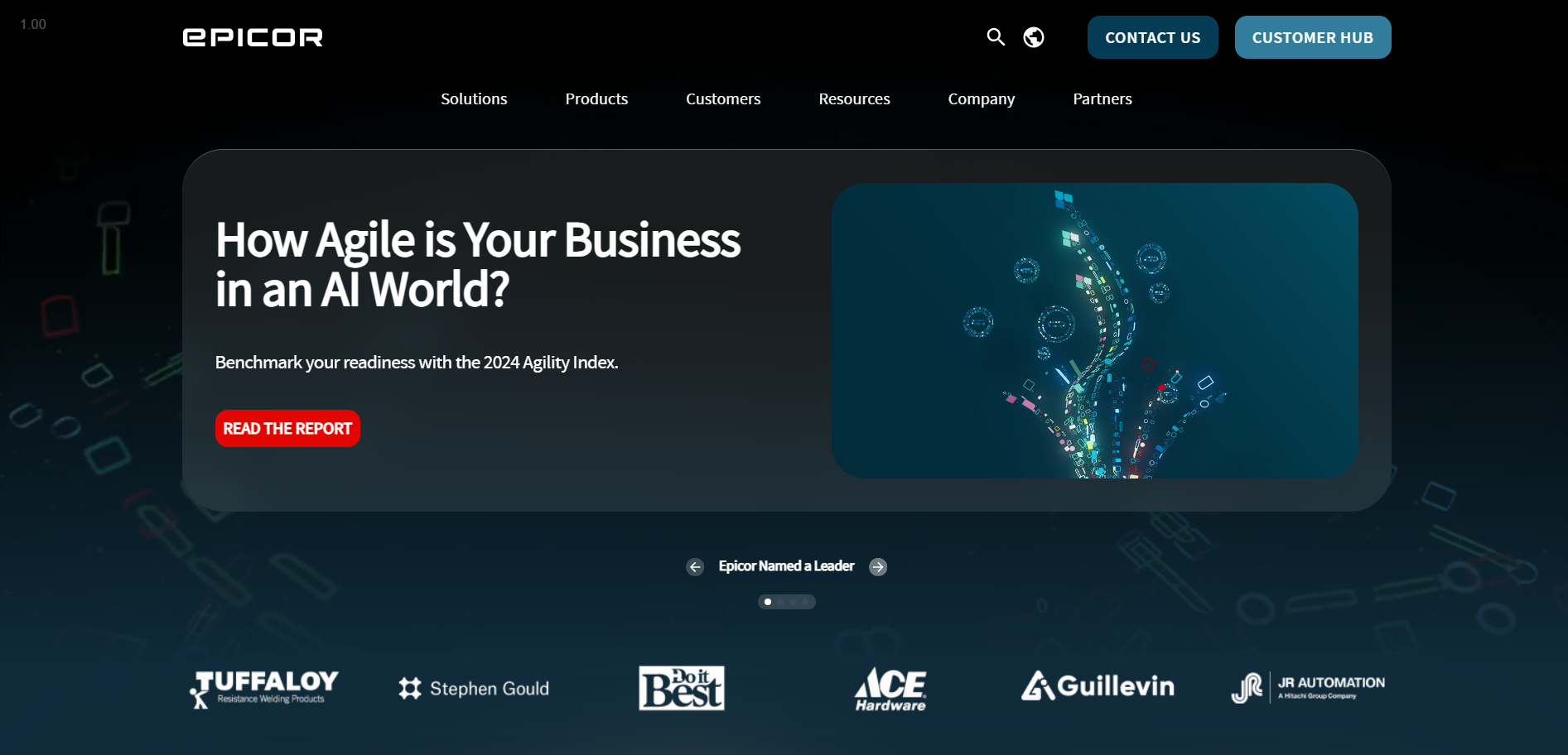
Epicor ERP for Distribution is tailored for businesses navigating the intricate web of modern supply chains. Renowned for its industry-specific solutions, Epicor's distribution capabilities bolster businesses in mastering the challenges of logistics and distribution with a keen eye on improving sales management and automation.
Top 5 Features:
- Comprehensive distribution management to optimize logistics workflows.
- End-to-end sales order management for improved customer transactions.
- Deep analytics for inventory optimization and demand forecasting.
- Easy integration with CRM and e-commerce platforms.
- Mobile access for on-the-go management of distribution processes.
Five Benefits:
- Enhances logistics effectiveness with specialized distribution management.
- Streamlines sales processes, from order to delivery, improving customer experiences.
- Employs analytics to ensure inventory levels meet demand without excess.
- Facilitates coordination between sales, inventory, and customer data for holistic management.
- Supports business operations from anywhere, fostering flexible management capabilities.
Two Cons:
- The system may require considerable customization for niche business needs.
- The initial learning curve could be steep for staff not familiar with ERP solutions.
Best For: Epicor ERP for Distribution is best for mid-sized businesses focused on distribution or wholesale trade that require robust ERP functionality with an emphasis on sales and logistics integration.
7. Körber
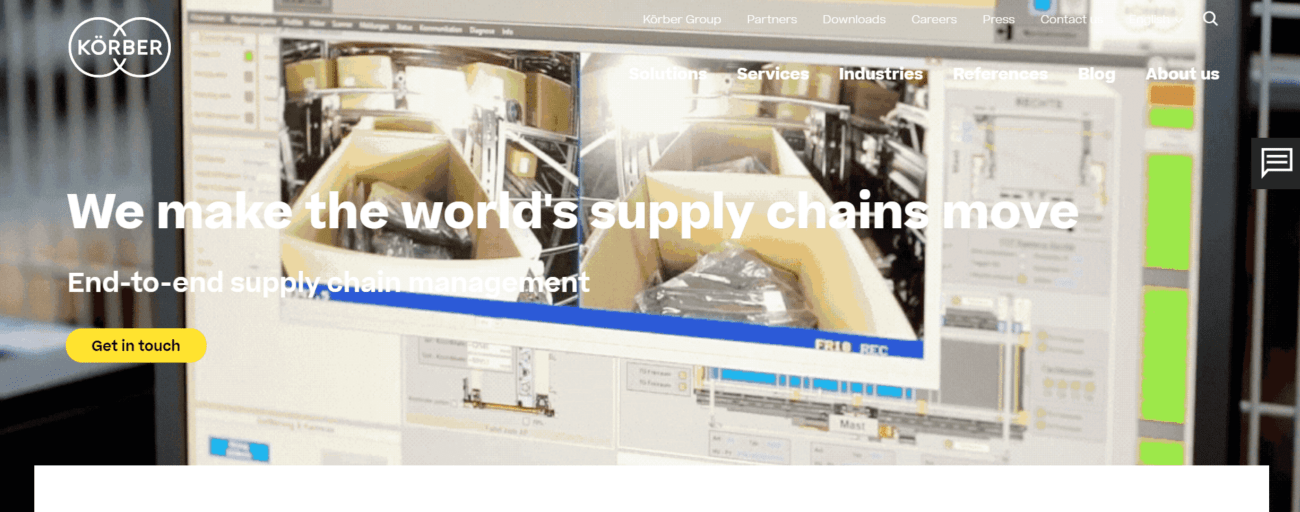
Körber is a specialized solution that elevates warehouse operations through its adaptable and innovative approach to logistics management. Körber's solution is geared towards meeting the unique needs of individual warehouses, recognizing that one size does not fit all when it comes to effectively managing warehouse space and processes.
Top 5 Features:
- Advanced warehouse management system (WMS) with real-time functionality.
- Labor management tools to enhance productivity and reduce operational costs.
- Third-party logistics (3PL) support for expansive network management.
- Mobile barcode scanning for inventory accuracy and efficiency.
- Reporting and analytics for ongoing performance assessment and improvement.
Five Benefits:
- Provides real-time visibility and control over warehouse activities, enhancing efficiency.
- Reduces labor costs and increases worker productivity through impactful data insights.
- Seamlessly manages 3PL operations, extending logistics capabilities.
- Ensures precise inventory management with cutting-edge barcode technology.
- Delivers actionable intelligence for strategic improvements through analytics.
Two Cons:
- May require a tailored setup process to align with specific warehouse processes.
- Interface and user experience might not be as polished as more modern ERP systems.
Best For: Körber is an ideal option for businesses of all sizes looking for a flexible WMS that can grow with their operations, especially for those with complex warehousing needs or a heavy reliance on 3PL partnerships.
8. Manhattan Associates
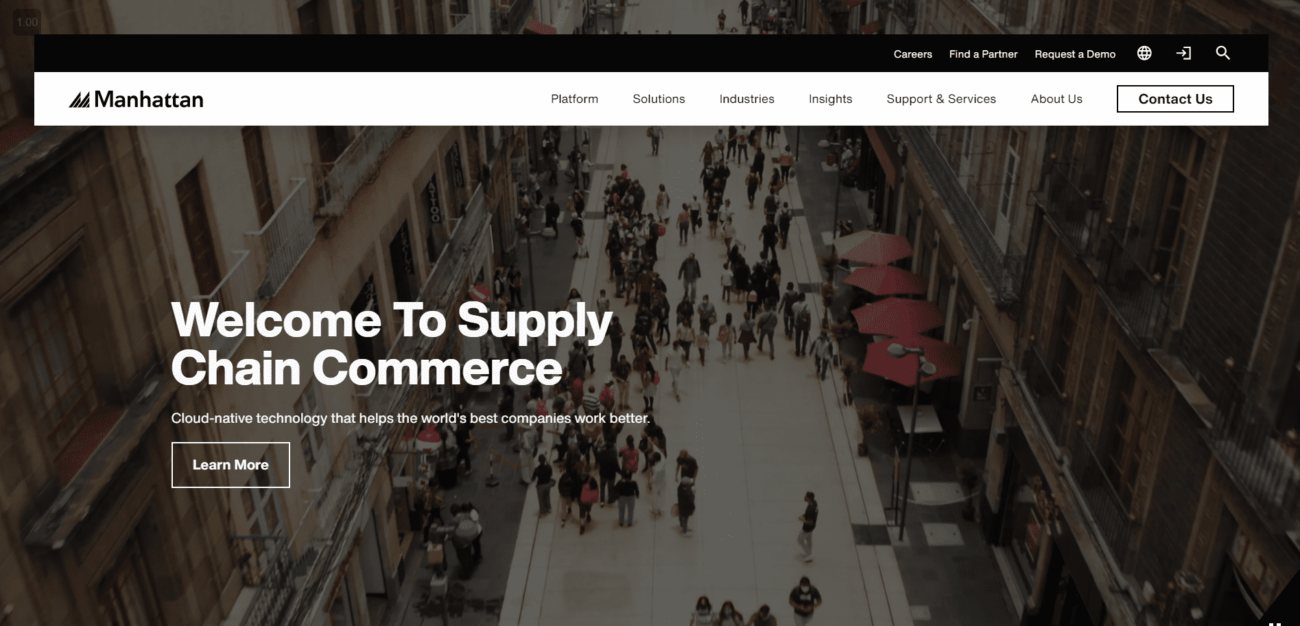
Manhattan Associates is a beacon in the world of omnichannel logistics, offering solutions that smooth the complexities involved in managing multiple sales channels. Its software provides the agility to adapt to the quick-shifting demands of both online and brick-and-mortar retail environments.
Top 5 Features:
- Omnichannel order management to centralize orders from all sales channels.
- Warehouse and inventory management for enhanced product flow.
- Transportation management for cost-effective shipping solutions.
- Labor management to align workforce activities with demand.
- Advanced analytics dashboard for performance tracking and decision-making insights.
Five Benefits:
- Creates a streamlined order fulfillment process tailored for omnichannel retail strategies.
- Manages inventory with precision across numerous locations and sales platforms.
- Optimizes transportation costs and ensures timely deliveries, enhancing customer experiences.
- Synchronizes staff efficiently to demand, boosting productivity and reducing downtime.
- Equips businesses with data-driven analytics to inform strategic choices and quick adaptations.
Two Cons:
- The comprehensive scope might result in a higher cost of implementation.
- The initial integration process can be intensive for businesses with pre-existing complex systems.
Best For: Manhattan Associates is best suited for large retailers and medium-sized businesses that operate across multiple sales channels and require a Logistics ERP solution that excels in omnichannel integration and management.
9. IFS Applications
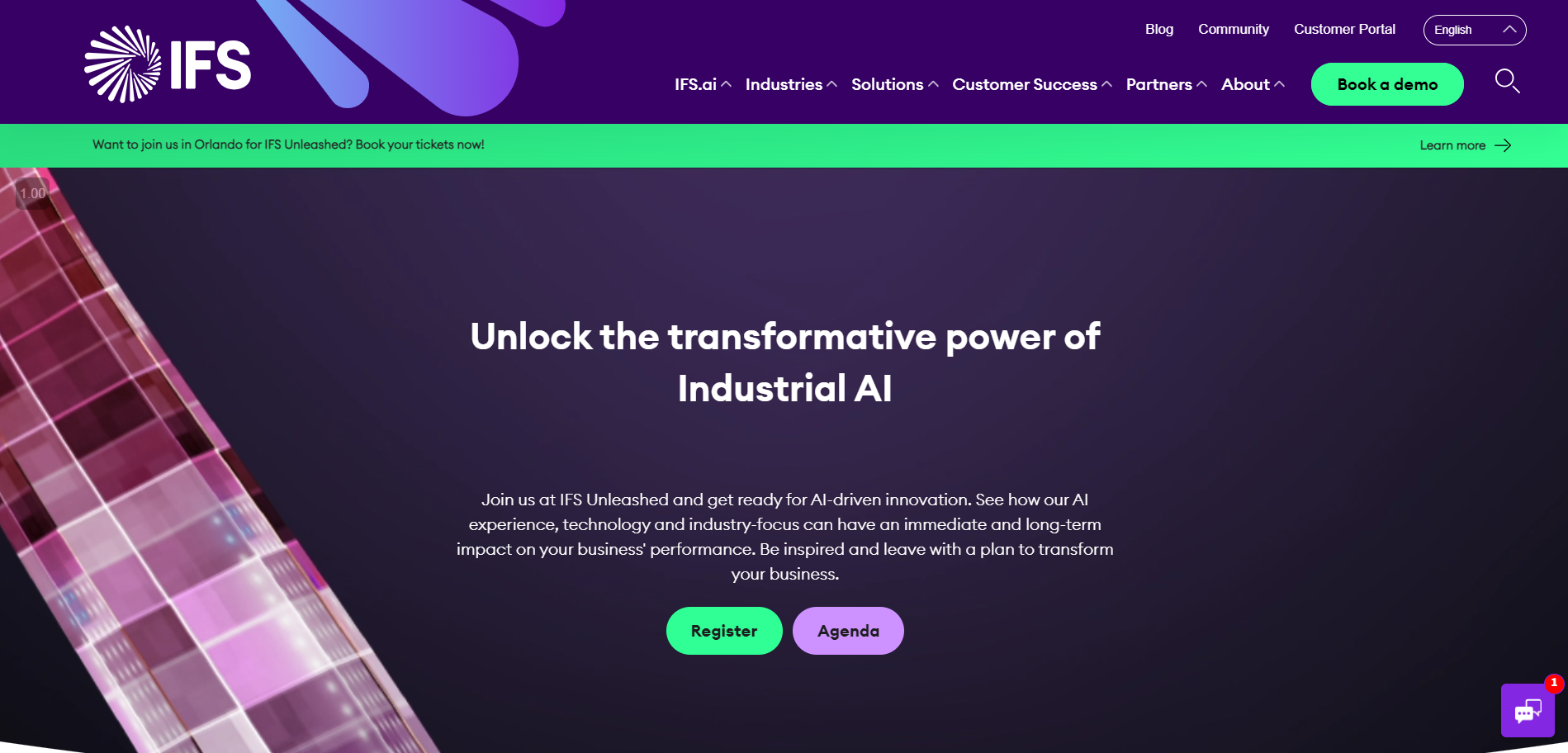
IFS Applications shines in the arena of asset-intensive industries, providing a Logistics ERP system designed for nuanced control over service and asset management. With a sharp focus on lifecycle management and service delivery, IFS Applications help businesses maintain assets effectively and provide stellar services that meet customer expectations.
Top 5 Features:
- Asset lifecycle management for a holistic view of asset performance.
- Service management tools catered to deliver superior customer service.
- Project management functionalities for precise planning and execution.
- Mobile solutions for remote access to ERP applications and data.
- Integrated finance capabilities for tighter control over costs and revenue.
Five Benefits:
- Ensures optimal asset utilization and extends longevity through detailed life cycle management.
- Elevates customer service with tools that support fast, reliable, and customizable service delivery.
- Delivers effective project oversight, enhancing the probability of on-time and within-budget completion.
- Empowers your team with access to critical ERP functions anywhere, anytime.
- Streamlines financial management, linking it to service and asset performance.
Two Cons:
- It may include features beyond the needs of businesses not heavily focused on asset management.
- The ERP's depth can necessitate a higher learning curve for users less experienced with such platforms.
Best For: IFS Applications is best for larger businesses, particularly those in manufacturing, utilities, or any industry with a substantial focus on managing physical assets and providing services. It's particularly effective where complex project management and service quality are differentiators.
10. Syspro ERP
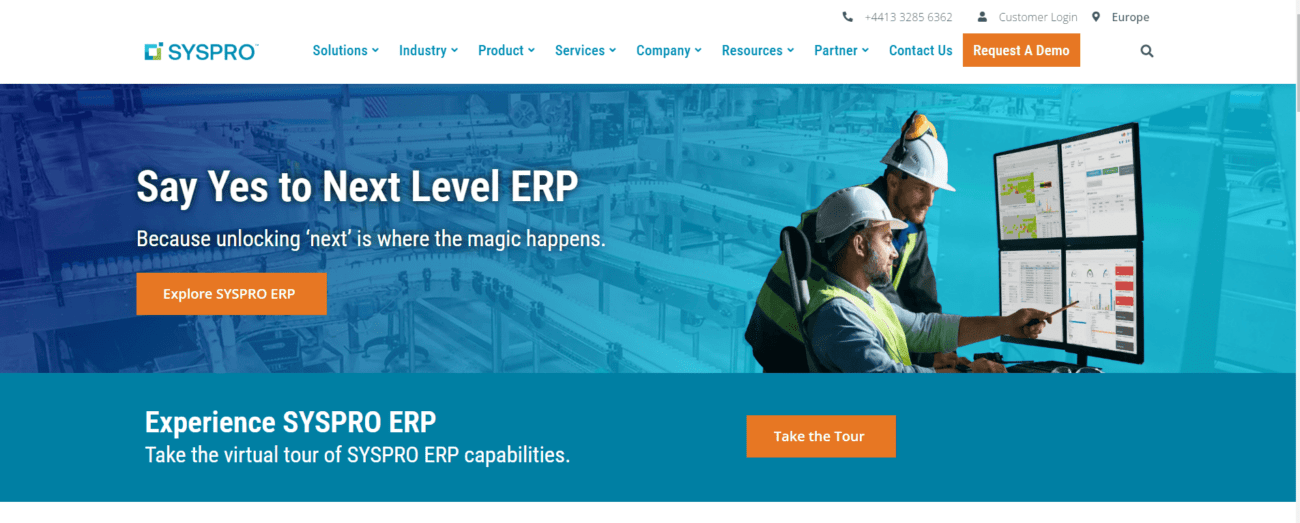
Syspro ERP stands as a formidable choice for businesses laser-focused on mastering inventory and order management. Known for its robust features tailored to the manufacturing and distribution sectors, Syspro offers a suite of tools that streamline complex processes, ensuring your inventory is a strategic asset rather than a challenge.
Top 5 Features:
- Detailed inventory management for accurate stock control.
- Order management system for streamlined sales processes.
- Advanced demand forecasting to anticipate market needs.
- Real-time analytics for continuous operational insights.
- Comprehensive supply chain management to orchestrate workflows from supplier to customer.
Five Benefits:
- Improves inventory accuracy, minimizing stockouts and overstock scenarios.
- Optimizes order processing, reducing lead times and enhancing customer satisfaction.
- Employs predictive analytics for better resource planning and inventory investment.
- Furnishes immediate access to business-critical information for agile decision-making.
- Delivers broad control over supply chain operations, improving efficiency and collaboration.
Two Cons:
- The intricate nature of customization may require expert assistance.
- Implementation and full utilization might be more time-consuming for larger enterprises.
Best For: Syspro is particularly advantageous for small to mid-sized manufacturing and distribution companies who require an effective ERP system to manage inventory and orders with fine-tuned precision.
Features to Look for When Choosing a Logistics ERP System
Below are the most important features to look for when choosing a logistics ERP software.
Inventory management and optimization capabilities
When scouting for the best Logistics ERP system, inventory management and optimization capabilities should be at the top of your list. These features are the linchpins of successful logistics, ensuring that you meet demand without overstocking, improve turnover rates, and minimize waste.
- Automated inventory tracking to reduce errors and save time.
- Forecasting tools for data-driven procurement and stocking decisions.
- Multi-warehouse management for consistent stock across locations.
- ABC analysis to prioritize inventory management efforts.
- Lot and serial number tracking for enhanced traceability and compliance.
Inventory optimization not only keeps your storage costs in check, but also paves the way for higher customer satisfaction with better product availability. The right ERP system strikes a balance between demand and supply, and translates inventory management into a competitive advantage that aligns with your financial goals.
Real-time tracking and visibility of shipments
Real-time tracking and visibility of shipments are indispensable features that should be embedded in a top-notch Logistics ERP system. They provide a clear line of sight into the movement of goods, enabling dynamic logistics management and exceptional customer service.
- GPS tracking for pinpoint accuracy on shipment locations.
- Live status updates to proactively manage delivery times.
- Integration with carriers for seamless, up-to-the-minute information.
- Alerts and notifications for immediate issue resolution.
- Mobile access for tracking on the go, ensuring you're always informed.
Having these competencies ensures that you're equipped to meet the transparency demands of modern commerce. You can manage customer expectations effectively, resulting in fewer service disruptions and a stronger, trust-based relationship with your clients.
Integration with supply chain partners
Integration with supply chain partners is a crucial feature to look for in a Logistics ERP system. Robust integration capabilities enhance collaboration, streamline communication, and synchronize your operations with those of your suppliers, manufacturers, distributors, and retailers.
- API access for seamless connectivity with external systems.
- EDI capabilities for efficient order and invoice processing.
- Collaborative platforms for sharing forecast data and inventory levels.
- Supplier and customer portals for direct access to relevant logistics information.
- Real-time data exchange to support synchronized supply chain activities.
Whe you enable seamless data flows between your business and your partners, you can forge a more responsive and integrated supply chain. This interconnectedness can lead to better resource planning, faster response times, and ultimately, a more agile and resilient operation.
Automation of routine tasks and workflows
Automation of routine tasks and workflows is a feature that stands out in a superior Logistics ERP system, acting as a catalyst for productivity and efficiency. It is this ability to automate that elevates your operations above the mundane, freeing your team to engage in more strategic activities.
- Automated order-to-cash processes that ensure swift and accurate billing.
- AI-assisted inventory restocking to prevent shortages or excess.
- Rule-based workflow triggers that streamline task assignments and approvals.
- Robotic Process Automation (RPA) for handling repetitive data entry jobs.
- Machine learning algorithms for predictive maintenance, avoiding costly downtimes.
When you implement an ERP system with strong automation features, you can minimize human error, significantly cut down on time-consuming tasks, and align your workforce with innovation and growth-oriented endeavors.
Data analytics and reporting tools
Data analytics and reporting tools are indispensable for any Logistics ERP system worth its salt. These tools delve into your logistics operations, turning data into knowledge and enabling data-driven decisions.
- Custom report generation for targeted analysis.
- Dashboards visualizing KPIs for instant insights.
- Predictive analytics for forecasting and trend spotting.
- Prescriptive analytics to suggest the best courses of actions.
- Ad-hoc reporting for answering spontaneous business inquiries.
The insights gleaned from these analytics and reporting capabilities not only inform you about past performance but also illuminate future paths. They empower you to constantly refine and enhance your logistics operations in alignment with your business strategy.
Customer relationship management (CRM) features
The addition of Customer Relationship Management (CRM) features to a Logistics ERP system can be transformative, allowing businesses to cultivate deeper relationships with their clients through meticulous tracking and management of every customer interaction.
- Comprehensive customer databases for a 360-degree view of interactions.
- Sales and marketing tools for targeted campaign management.
- Service management for swift resolution of customer issues.
- Lead and opportunity management for nurturing potential customers.
- Analytics to understand customer behavior and preferences.
The CRM capabilities enable businesses to offer personalized service, improve customer satisfaction, and drive loyalty. With such features, a Logistics ERP system not only manages the physical flow of products but also strengthens the customer relationships that drive your business's success.
Scalability to grow with your business needs
Scalability in a Logistics ERP system ensures that your technology investment can keep pace with your business's growth, regardless of the speed or direction that growth takes.
- Modular architecture to add or remove functionalities as needed.
- Cloud infrastructure for accommodating increased data and user loads.
- Flexible pricing models that align with changing business sizes and needs.
- Global capabilities for handling multi-currency, multi-language, and compliance aspects.
- Scalable data storage and processing power to support expanding operations.
The scalability of an ERP system is a significant advantage, allowing you to adapt swiftly to market changes, diversify offerings, or expand operations without outgrowing the technology that supports your business.
Mobile accessibility for on-the-go management
Mobile accessibility is a feature that catapults Logistics ERP systems into the realm of omnipresent management. The power to manage logistics operations from a smartphone or tablet allows you to stay in command, no matter where you are.
- Responsive design for full functionality on any mobile device.
- Real-time alerts and notifications to keep you informed on the move.
- Mobile dashboards for monitoring KPIs and critical data points.
- App integrations for signing off on transactions and authorizations.
- Offline capabilities to ensure productivity even without an internet connection.
This mobile flexibility ensures that you're never out of touch with your logistics operations, fortifying your ability to make timely decisions and remain agile in the face of unforeseen challenges.
Compliance and security protocols to protect data
Compliance and security protocols are designed to protect not only your data but also your reputation. In an age where data breaches are costly, both financially and to consumer trust, robust security measures are non-negotiable.
- Data encryption to secure sensitive information both at rest and in transit.
- User access controls to ensure data integrity and restrict unauthorised access.
- Regular security updates and patches to safeguard against new threats.
- Compliance features that align with industry standards and regulations like GDPR.
- Audit trails for complete visibility into data histories and modifications.
When your ERP system is fortified with these security and compliance protocols, you can assure clients their data is safe with you, and secure their trust and potentially attract security-conscious customers.
User-friendly interface and ease of use for staff
A user-friendly interface and ease of use are fundamental in ensuring that staff can fully embrace the Logistics ERP system. Simplifying the user experience translates to less resistance to change, faster training, and increased productivity right out of the gate.
- Intuitive design to reduce complexity and user frustration.
- Personalized dashboards that can be adapted based on role or preference.
- Tooltips and in-app guidance to facilitate onboarding and daily use.
- Shortcuts for common tasks to save time and enhance user satisfaction.
- Cross-device consistency ensures a seamless experience regardless of platform.
An ERP system that scores high on user-friendliness helps precipitate a smooth transition, fosters a positive user culture, and ultimately contributes to a quicker realization of the benefits of logistics process automation.
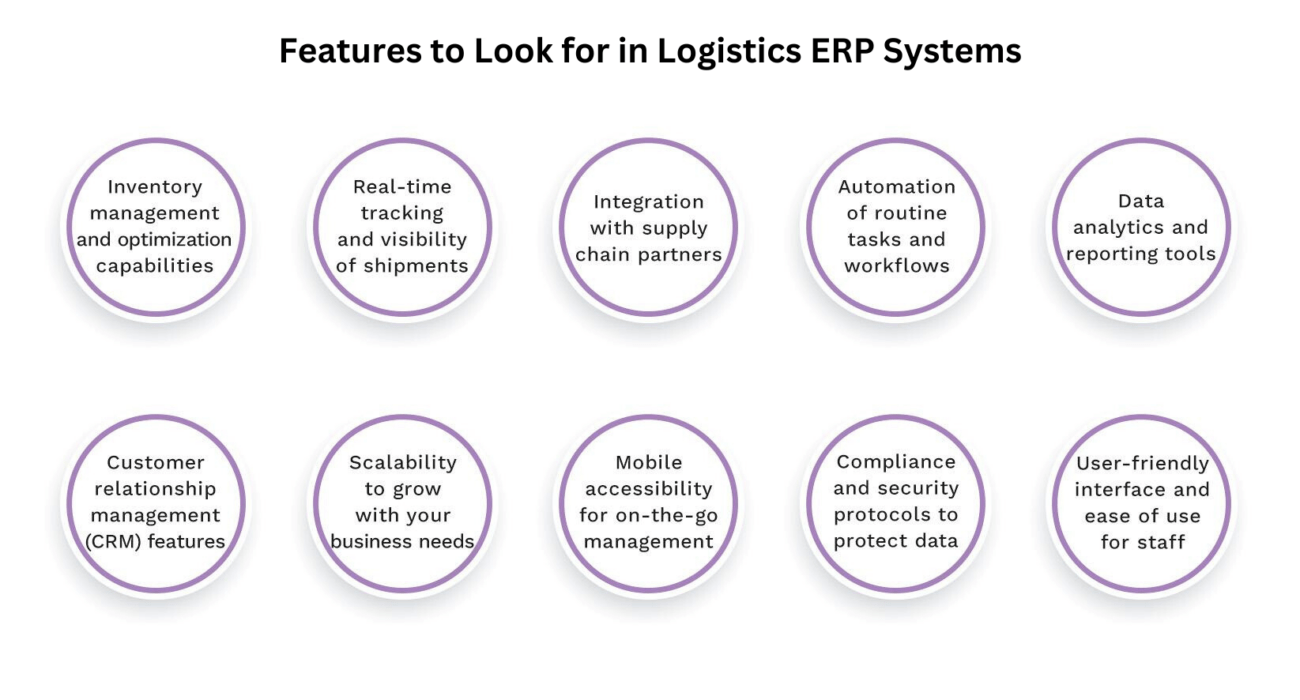
Transform Your Logistics Operations with Kohezion
Are you looking to take your logistics operations to the next level? Kohezion could be just the powerful ally you need. Built with versatility in mind, this user-customizable platform empowers you to tailor a solution that fits perfectly with your unique business model. With Kohezion, logistics transformation is at your fingertips—no code necessary.
With Kohezion, you streamline key logistics processes without the constraints of one-size-fits-all software. Its no-code application building platform allows you to create custom apps that address specific needs, boosting efficiency across the board. Coupled with comprehensive training and support, Kohezion ensures a smooth transition from your current system and stands by you as you redefine logistics success.
Transform your business, not just your logistics. Unlock the innovation and coordination that a logistics ERP system like Kohezion provides. Go beyond traditional logistics management and create an integrated, agile, and responsive supply chain network with Kohezion at the heart.
Conclusion
In a world where efficiency, accuracy, and customer satisfaction are paramount, Logistics ERP systems are not just helpful; they're essential. When you choose a system that aligns with your unique business needs, like Kohezion, you set the stage for a future where challenges in logistics management are met with smart, scalable, and sustainable solutions.
With the power of real-time insights, automation, and seamless integrations, Logistics ERP systems are more than just a software choice—they're a strategic decision that propels your entire supply chain management into a new echelon of proficiency. Remember, the right ERP solution is the one that not just fits your current landscape but also adapts to your growth and expands your potential.
As you ponder your next move in logistics operations, consider how the transformative power of a Logistics ERP system can redefine the way you conduct business, serve customers, and stay ahead of the competition. The investment you make today could be the catalyst for tomorrow's success.
Start building with a free account
Frequently Asked Questions
The main functions of a Logistics ERP system include inventory management, order processing, supply chain planning, warehouse management, transportation management, and customer relationship management. Each function is integrated to optimize logistics efficiency and streamline business processes.
ERP software provides up-to-the-minute data across the supply chain. Users can monitor inventory levels, track shipments, and obtain actionable insights, enabling quick, informed decisions to optimize logistics operations.
Yes, Logistics ERP Systems can integrate with other enterprise applications such as CRM, TMS, and WMS, enhancing data exchange and operational consistency across all business functions.
Analytics and reporting in a Logistics ERP system provide insights into operations, identify trends, track performance, and highlight areas for improvement, helping to drive strategic decisions and optimize the supply chain.

